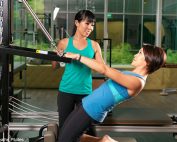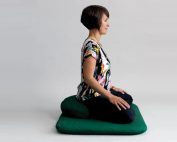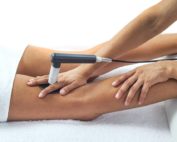5 signs of knee arthritis and how to treat it
by Steven (Xuelong) Qin, Clinic Director, Advanced Physio Care
3-minute read
Ever felt pain or a grinding sensation as you walk? Or maybe you experience a limited range of motion with your leg and knee before pain sets it? If you nodded your head, you probably are suffering from arthritis of the knee. Osteoarthritis (OA) is the most common type of knee arthritis that slowly wears away your joint cartilage and commonly occurs after your middle age.
Rheumatoid arthritis (RA) can strike at any time and post-traumatic arthritis can develop following an injury to the knee. Athletes that suffer from ligament injuries or torn meniscus are more prone to developing this form of knee arthritis.
Before you visit your nearest physiotherapy clinic, let’s quickly run around the 5 signs and symptoms that show you might be suffering from knee arthritis.
Sign #1: A gradual pain increase as you move
It is common not to notice the signs of arthritis until it is too late. Arthritis pain might suddenly occur, but it is more likely to develop over time – especially if you are on the move. For example, after walking for a prolonged period of time, your knees might start to hurt. The pain can further be amplified when you climb the stairs, stand up from a sitting position or kneel.
Sometimes, you might notice pain also developing after you have been inactive for a while.
Sign #2: Swelling or tenderness of the knee
Arthritis of the knee may cause periodic inflammation that stems from the formation of extra fluids in the knee. Swelling could be more pronounced especially in the morning after you wake or periods of long inactivity.
Sign #3: A cracking or grinding sensation in the knee
PAs you go about your daily activities, you might feel a grinding sensation that is followed by cracking or popping sounds and sensations from your knees. This normally occurs when you have lost some of the smooth cartilage of the knee and it is the rough surfaces and bone spurs rubbing against each other that causes these noises.
Sign #4: Limited range of motion
One key symptom of knee arthritis is the limited range of motion people suffer. This causes previously simple movements in everyday life difficult and painful. From the inability to fully extend or bend your knee and leg to climbing the stairs in an awkward manner, a limited range of motion can evolve into severe motion problems that require you to walk around with a cane or walker.
Sign #5: Buckling and locking
Over time, the loss of stability could lead to the entire joint structure of your knee to become unstable. This could cause the knee to give way or buckle. The joint could also stick or lock up to the point it really isn’t possible to bend it or straighten it fully.
While these symptoms can come and go, it is important to take note as it could be a warning sign of arthritis.
Over time, your knee muscles may weaken and the entire joint structure can become unstable. Overall weakness in the knee can cause it to give way or buckle. The joint can also stick or lock up so that you can’t bend it or straighten it out. You may find that these symptoms come and go.
Home Remedies To Treat
While the best way to treat knee arthritis is through knee pain physiotherapy treatments, there are a few remedies that could assist in preserving your knee function and relieve you from pain.
Light exercises
These include knee pain and arthritis exercises like water aerobics and strength training that help to strengthen the muscles around your knee without compromising and causing further damage to your knees.
Hot & cold therapy
Hot and cold therapy also helps to make a world of difference when it comes to knee arthritis pain. From warm baths to hot showers, proper application of heat will help to ease the stiffness in your joints. Cold treatments however, are ideal for relieving joint pain, swelling and inflammation and can be easily done with a pack of ice or frozen gel.
Massages
Massages focus around the knee can help to reduce pain and stiffness while also improving your range of motion. Your physiotherapist can help to recommend the type of massage that will work best for your unique condition.
What next?
Looking for expert care and a physiotherapist in Singapore to treat any knee arthritis problems? Come down to our physiotherapy clinic in the heart of Singapore’s business district and let our physiotherapists relieve any strain and pain you might have and restore function and mobility back to your knee. You can also book a 20-minute video consultation call with me for just $1 a minute.




